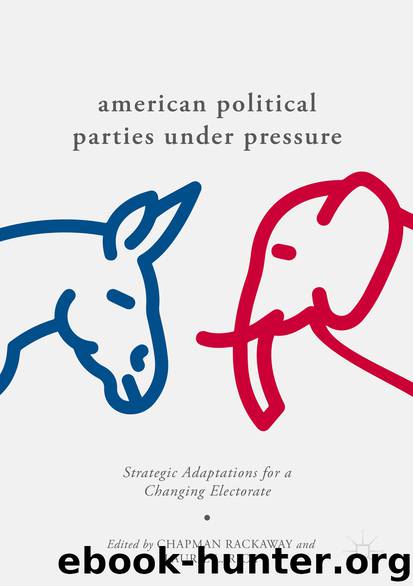American Political Parties Under Pressure by Chapman Rackaway & Laurie L. Rice

Author:Chapman Rackaway & Laurie L. Rice
Language: eng
Format: epub
Publisher: Springer International Publishing, Cham
Half way through the second decade of the twenty-first century, the even divide in the American electorate on gay rights gave way to a plurality in support of gay rights that sometimes has achieved majority status. More and more polls, including the Pew Research time series, showed majority support in the public for gay marriage . In that environment, the Supreme Court decided two cases with significant implications for gay rights. In United States v. Windsor (2013), the Court ruled the Defense of Marriage Act’s federal definition of marriage to be unconstitutional, on the basis that it served no legitimate basis except to interfere with the prerogative of states to acknowledge same-sex marriage. Windsor did not reach the question of the constitutionality of gay marriage , resting its decision on federalism and the state prerogative to define marriage (2013b). In Hollingsworth v. Perry (2013), the Court considered the constitutionality of California Proposition 8, which was an amendment to the California state constitution banning same-sex marriage, because the parties bringing the appeal lacked standing—a right to sue. The Court avoided speaking to the efficacy of state bans on same-sex marriage in its decision, instead choosing to dismiss the case on standing, leaving the lower court ruling against California Proposition 8 in place (2013a). In June 26, 2015, in the case of Obergefell v. Hodges , the US Supreme Court ruled, in a 5–4 decision authored by Supreme Court Associate Justice Anthony Kennedy, that the US Constitution protects the fundamental right to marry, and that the right to marry for same-sex couples is guaranteed by both the Due Process Clause and the Equal Protection Clause of the Fourteenth Amendment to the US Constitution (2015). Public opinion in support of gay marriage and gay rights continued to grow in the wake of these landmark decisions .
More recently, transgender issues have become more salient in political debates. On March 23, 2016, North Carolina Governor Pat McCrory signed the Public Facilities Privacy & Security Act, a bill that overturned an LGBT anti-discrimination ordinance passed by Charlotte, North Carolina, that, among its provisions, permitted transsexuals to use public bathrooms consistent with their gender identity. It further forbade any other local governments in the state from adopting similar ordinances. The Obama Justice Department determined that the bill was in conflict with federal law, such as Title VII of the Civil Rights Act, and put the state on notice that it may lose billions of dollars of federal funding to the state (Shoichet 2016). In an independent move, the Obama Administration issued a transgender bathroom “guidance” to public schools that they must not treat transgender students differently from other students of the same gender identity, and that the school must provide equal access and provide accommodations to transsexual students, such as gender neutral bathrooms. Failure to comply may deprive a state or locality of significant federal education funds. Nine states sued in federal court challenging the Obama administration’s policy, and the Trump administration withdrew the guidance (Trotta 2017).
Download
This site does not store any files on its server. We only index and link to content provided by other sites. Please contact the content providers to delete copyright contents if any and email us, we'll remove relevant links or contents immediately.
| Elections & Political Process | Ideologies & Doctrines |
| International & World Politics | Political Science |
| Public Affairs & Policy | Specific Topics |
| United States |
The Secret History by Donna Tartt(19086)
The Social Justice Warrior Handbook by Lisa De Pasquale(12190)
Thirteen Reasons Why by Jay Asher(8909)
This Is How You Lose Her by Junot Diaz(6885)
Weapons of Math Destruction by Cathy O'Neil(6279)
Zero to One by Peter Thiel(5801)
Beartown by Fredrik Backman(5754)
The Myth of the Strong Leader by Archie Brown(5507)
The Fire Next Time by James Baldwin(5442)
How Democracies Die by Steven Levitsky & Daniel Ziblatt(5218)
Promise Me, Dad by Joe Biden(5153)
Stone's Rules by Roger Stone(5087)
A Higher Loyalty: Truth, Lies, and Leadership by James Comey(4960)
100 Deadly Skills by Clint Emerson(4924)
Rise and Kill First by Ronen Bergman(4788)
Secrecy World by Jake Bernstein(4752)
The David Icke Guide to the Global Conspiracy (and how to end it) by David Icke(4717)
The Farm by Tom Rob Smith(4507)
The Doomsday Machine by Daniel Ellsberg(4490)
